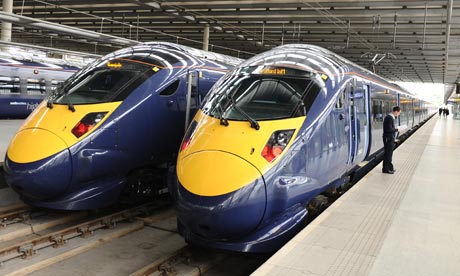
When will London start feeling the Olympic strain?
Peter Hendy, the Transport for London (TfL) commissioner, has warned that the capital will see a big rise in visitor numbers from 15 July onwards. He said counterparts from previous host cities had warned him: "Don't underestimate how many people will come, even without tickets, just to be in London." Although the Games do not begin until 27 July, the "Olympic family" of athletes, officials and media will begin arriving in London to prepare from 14-15 July.
Will the transport infrastructure cope with the increased demand?
It depends who you ask. Boris Johnson, the London mayor, is adamant the capital will not suffer gridlock, dismissing such gloomy predictions as "complete and utter nonsense". But in February, Network Rail's chief executive, Sir David Higgins, said London's transport system would inevitably be disrupted by the Games.
"During the Games bad things will happen," he told the BBC. "There is going to be track circuit failure, there will be overhead line breakages, there will be cable theft. Probably there will be suicides – there always are over a 60-day period, that's just going to happen unfortunately … The message to the public should be: 'There are going to be disruptions … [But] we shouldn't get excited about it, we shouldn't panic about it.'"
What special transport measures have been put in place to deal with the extra demand?
Tube services during the Games will generally start at the usual time of 5am - 5.30am but end an hour later at night. The last trains from central London will leave at around 1.30am. Sunday tube services will start 30-45 minutes earlier than usual, at around 6.30am. Extra evening services will run on the Jubilee, Central and District lines and there will be more trains running in the late evening from 3 August, when events start at the Olympic Stadium. Some stations will introduce entry- or exit-only measures and could close completely if demand outstrips capacity.
Some bus routes will be diverted or disrupted by road events. Extra buses will be added on some routes to cater for additional passengers.
National Rail services from London will operate later than normal and last trains to locations within 2-3 hours of London will typically leave between midnight and 1am. Some trains may leave even later, such as Euston to Manchester at 1.30am. National Rail will run longer and/or more frequent trains to and from most venue stations during events.
What about the roads?
According to TfL, only 30% of road journeys in London will be affected by the Games; there will also be a ban on planned roadworks during the period.
However, roads will be affected at certain times and in certain locations, particularly in central London and around Games venues.
Thirty miles of the capital's roads will be turned into "Games lanes", reserved exclusively for Olympic transport. The stretches, dubbed "ZiL lanes" by critics, are only going to be closed shortly before the Games.
A report published in January claimed road users could face a "perfect storm" on the opening weekend of the Olympics, predicting "huge stress" on London's road networks.
The opening ceremony on 27 July coincides with the usual Friday rush hour and "holiday getaway" traffic leaving the capital via corridor routes and the M25.
And the Javelin train?
The high-speed service shuttling spectators from central London to the Olympic Park is likely to become so strained that rail bosses have made contingency plans to turn thousands of passengers away at peak times.
Although the Olympic Delivery Authority insists it has "robust plans for a smooth operation", it seems that some hoping for a fast train ride may have to travel by bus or tube.
In May, Robin Gisby, director of operations for Network Rail, told the Commons transport select committee that queues may be such that they will advise passengers to take alternative routes. These routes take, according to TfL's calculations, five or six times longer even without factoring in Olympic queues.
When will it all end?
The great exodus will kick off on 13 August, with Heathrow expected to have its busiest ever day as 65% of Olympic visitors leave. The airport is expecting 500,000 passengers to fly into London for the Olympic and Paralympic Games and has recruited 1,000 volunteers to help them off planes and welcome them to London.

